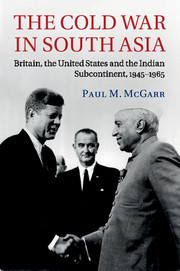Description
The Cold War in South Asia
Britain, the United States and the Indian Subcontinent, 1945–1965
Author: McGarr Paul M.
This book traces the rise and fall of Anglo-American relations with India and Pakistan from independence in the 1940s, to the 1960s.
Language: English
Subject for The Cold War in South Asia:
Approximative price 39.35 €
In Print (Delivery period: 14 days).
Add to cart
The Cold War in South Asia
Publication date: 11-2015
Support: Print on demand
Publication date: 11-2015
Support: Print on demand
Approximative price 114.03 €
In Print (Delivery period: 14 days).
Add to cart
The Cold War in South Asia
Publication date: 08-2013
406 p. · 15.5x23.1 cm · Hardback
Publication date: 08-2013
406 p. · 15.5x23.1 cm · Hardback
Description
/li>Contents
/li>Biography
/li>
The Cold War in South Asia provides the first comprehensive and transnational history of Anglo-American relations with South Asia during a seminal period in the history of the Indian Subcontinent, between independence in the late 1940s, and the height of the Cold War in the late 1960s. Drawing upon significant new evidence from British, American, Indian and Eastern bloc archives, the book re-examines how and why the Cold War in South Asia evolved in the way that it did, at a time when the national leaderships, geopolitical outlooks and regional aspirations of India, Pakistan and their superpower suitors were in a state of considerable flux. The book probes the factors which encouraged the governments of Britain and the United States to work so closely together in South Asia during the two decades after independence, and suggests what benefits, if any, Anglo-American intervention in South Asia's affairs delivered, and to whom.
Introduction; 1. India, Pakistan and the early Cold War, 1947–57; 2. Eisenhower, Macmillan and the 'New Look' at South Asia, 1958–60; 3. The best of friends: Kennedy, Macmillan and Jawaharlal Nehru; 4. Upsetting the apple cart: India's 'liberation' of Goa; 5. Allies of a kind: Britain, the United States and the 1962 Sino-Indian War; 6. Quagmire: the Anglo-American search for a Kashmir settlement; 7. Realigning India: Western military aid and the threat from the north; 8. The other transfer of power: Britain, the US and the Nehru-Shastri Transition; 9. A bumpy ride: Harold Wilson, Lyndon Johnson and South Asia; 10. Triumph and tragedy: the Raan of Kutch and the 1965 Indo-Pakistani War; Conclusion: the erosion of Anglo-American power in India and Pakistan; Select bibliography.
Paul McGarr is Lecturer in US Foreign Policy in the Department of American and Canadian Studies at the University of Nottingham. He has published widely on aspects of transnational politics, economics, defence, intelligence and security, and postcolonial culture.
© 2024 LAVOISIER S.A.S.




